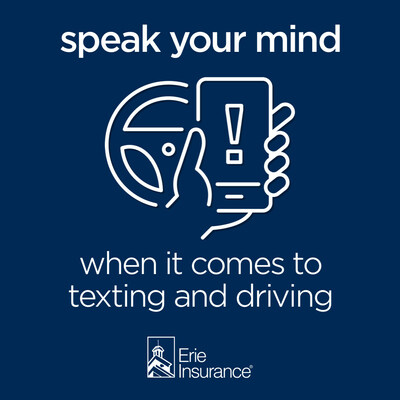As Summer Road Trip Season Starts, Erie Insurance Offers Tips from Psychologist on How to Speak up if Someone is Texting While Driving
National Survey Finds Passengers Who Speak Up Can Make a Huge Difference
Because speaking up can make such a big difference in stopping the dangerous behavior of texting while driving, Erie Insurance reached out to a psychology professor for tips for how passengers can overcome their discomfort with making "the ask."
Dr. Stanislaw Kolek is a visiting assistant professor at
- Negotiation – This method involves acknowledging the situation and providing a solution. "If you are in a car and the driver starts texting, you could say, 'It looks like you really need to be texting someone right now so why don't you let me drive? I can drive and you can text, and once we get to our destination, you can get back into the driver's seat,'" said Kolek. "It's a way to get them to realize that the behavior is not wanted and that you've already come up with a solution. Asking them if you can be the driver in that situation is usually a very non-antagonistic way of getting yourself out of a dangerous situation."
- Positive Reinforcement – Another tactic is to let the driver know how putting down their phone can benefit them. For example, Erie Insurance has a program called YourTurn, a smartphone app that enables safe drivers to earn rewards that can be used for gift cards or donated to charity. Within the first 30 days of using YourTurn, drivers have seen an average reduction of
35% in phone distractions,20% in hard braking and20% reduction in at-risk speeding. "Letting the driver know about a rewards program is a good approach, especially if they don't already know about it. You can say 'Hey, there is this app you can download and be rewarded if you just don't use your phone while driving,'" said Kolek. - Partnership and Mutual Accountability – This approach is like a buddy system in which two people both agree to do or not do something and hold each other accountable. It's often used when people are trying to, for example, increase how much they exercise or change their eating habits. It can also apply to breaking the bad habit of texting while driving. "You can say, 'If I don't text while driving, you can also not do it, and then we can both kind of keep each other accountable,'" said Kolek. The impact of this approach can be amplified if there are also mutually beneficial rewards attached. For example, if a married couple is on the same car insurance policy, both have to drive safely in order to get the best rate.
- Negative Consequences – Creating negative consequences for the driver is another tactic, but often is used only as a last resort if other, more positive approaches fail. One negative consequence, Kolek says, is social isolation with a group. "You can say, 'You're the driver and I am your passenger and we're a team right now. I really don't want to be in the car with you while you are texting.' That would probably be effective if the person is reasonable and wants you to continue riding with them," said Kolek.
You can watch a video of Dr. Kolek sharing tips for how to ask a driver to stop texting while driving here.
The data about the impact of speaking up is from a survey Erie Insurance commissioned to explore the notion that for society at large to stop a negative behavior, it has to become socially unacceptable. The survey asked people not for their personal opinions, but rather how they think society as a whole views texting while driving. Almost three-quarters (
About the Survey:
This survey was conducted online within
About Erie Insurance
According to A.M. Best Company, Erie Insurance Group, based in
![]() View original content to download multimedia:https://www.prnewswire.com/news-releases/as-summer-road-trip-season-starts-erie-insurance-offers-tips-from-psychologist-on-how-to-speak-up-if-someone-is-texting-while-driving-301831337.html
View original content to download multimedia:https://www.prnewswire.com/news-releases/as-summer-road-trip-season-starts-erie-insurance-offers-tips-from-psychologist-on-how-to-speak-up-if-someone-is-texting-while-driving-301831337.html
SOURCE Erie Insurance Group









